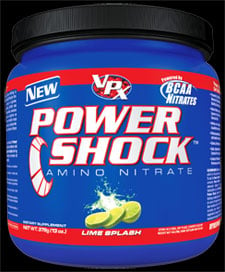 A recent study found that dietary supplementation with nitrate-rich beetroot juice reduced both the oxygen cost and the degree of PCr degradation during both low and high-intensity exercise, without affecting muscle pH. Pretty nifty if I do say so myself. In English, that means if you drink beetroot juice, which is high in dietary nitrates, it will help you exercise more efficiently and for a longer period of time. Amen to nitrates! Check out VPX’s Power Shock™, with BCAA Nitrates.
A recent study found that dietary supplementation with nitrate-rich beetroot juice reduced both the oxygen cost and the degree of PCr degradation during both low and high-intensity exercise, without affecting muscle pH. Pretty nifty if I do say so myself. In English, that means if you drink beetroot juice, which is high in dietary nitrates, it will help you exercise more efficiently and for a longer period of time. Amen to nitrates! Check out VPX’s Power Shock™, with BCAA Nitrates.
Scientific Proof: The purpose of this study was to elucidate the mechanistic bases for the reported reduction in the O(2) cost of exercise following short-term dietary nitrate (NO(3)(-)) supplementation. In a randomized, double-blind, crossover study, seven men (aged 19-38 yr) consumed 500 ml/day of either nitrate-rich beet root juice (BR, 5.1 mmol of NO(3)(-)/day) or placebo (PL, with negligible nitrate content) for 6 consecutive days, and completed a series of low-intensity and high-intensity "step" exercise tests on the last 3 days for the determination of the muscle metabolic (using (31)P-MRS) and pulmonary oxygen uptake (Vo(2)) responses to exercise. On days 4-6, BR resulted in a significant increase in plasma [nitrite] (mean +/- SE, PL 231 +/- 76 vs. BR 547 +/- 55 nM; P < 0.05). During low-intensity exercise, BR attenuated the reduction in muscle phosphocreatine concentration ([PCr]; PL 8.1 +/- 1.2 vs. BR 5.2 +/- 0.8 mM; P < 0.05) and the increase in Vo(2) (PL 484 +/- 41 vs. BR 362 +/- 30 ml/min; P < 0.05). During high-intensity exercise, BR reduced the amplitudes of the [PCr] (PL 3.9 +/- 1.1 vs. BR 1.6 +/- 0.7 mM; P < 0.05) and Vo(2) (PL 209 +/- 30 vs. BR 100 +/- 26 ml/min; P < 0.05) slow components and improved time to exhaustion (PL 586 +/- 80 vs. BR 734 +/- 109 s; P < 0.01). The total ATP turnover rate was estimated to be less for both low-intensity (PL 296 +/- 58 vs. BR 192 +/- 38 microM/s; P < 0.05) and high-intensity (PL 607 +/- 65 vs. BR 436 +/- 43 microM/s; P < 0.05) exercise. Thus the reduced O(2) cost of exercise following dietary NO(3)(-) supplementation appears to be due to a reduced ATP cost of muscle force production. The reduced muscle metabolic perturbation with NO(3)(-) supplementation allowed high-intensity exercise to be tolerated for a greater period of time.[1] And in another study: Pharmacological sodium nitrate supplementation has been reported to reduce the O2 cost of submaximal exercise in humans.
In this study, we hypothesized that dietary supplementation with inorganic nitrate in the form of beetroot juice (BR) would reduce the O2 cost of submaximal exercise and enhance the tolerance to high-intensity exercise. In a double-blind, placebo (PL)-controlled, crossover study, eight men (aged 19-38 yr) consumed 500 ml/day of either BR (containing 11.2 +/- 0.6 mM of nitrate) or blackcurrant cordial (as a PL, with negligible nitrate content) for 6 consecutive days and completed a series of "step" moderate-intensity and severe-intensity exercise tests on the last 3 days. On days 4-6, plasma nitrite concentration was significantly greater following dietary nitrate supplementation compared with PL (BR: 273 +/- 44 vs. PL: 140 +/- 50 nM; P < 0.05), and systolic blood pressure was significantly reduced (BR: 124 +/- 2 vs. PL: 132 +/- 5 mmHg; P < 0.01). During moderate exercise, nitrate supplementation reduced muscle fractional O2 extraction (as estimated using near-infrared spectroscopy). The gain of the increase in pulmonary O2 uptake following the onset of moderate exercise was reduced by 19% in the BR condition (BR: 8.6 +/- 0.7 vs. PL: 10.8 +/- 1.6 ml.min(-1).W(-1); P < 0.05). During severe exercise, the O2 uptake slow component was reduced (BR: 0.57 +/- 0.20 vs. PL: 0.74 +/- 0.24 l/min; P < 0.05), and the time-to-exhaustion was extended (BR: 675 +/- 203 vs. PL: 583 +/- 145 s; P < 0.05). The reduced O2 cost of exercise following increased dietary nitrate intake has important implications for our understanding of the factors that regulate mitochondrial respiration and muscle contractile energetics in humans.[2]
Science stuff to read
[1] S.J. Bailey, J. Fulford, A. Vanhatalo, P.G. Winyard, J.R. Blackwell, F.J. DiMenna, D.P. Wilkerson, N. Benjamin and A.M. Jones, Dietary nitrate supplementation enhances muscle contractile efficiency during knee-extensor exercise in humans, J Appl Physiol. 109 (2010) 135-148.
[2] S.J. Bailey, P. Winyard, A. Vanhatalo, J.R. Blackwell, F.J. Dimenna, D.P. Wilkerson, J. Tarr, N. Benjamin and A.M. Jones, Dietary nitrate supplementation reduces the O2 cost of low-intensity exercise and enhances tolerance to high-intensity exercise in humans, J Appl Physiol. 107 (2009) 1144-1155.





